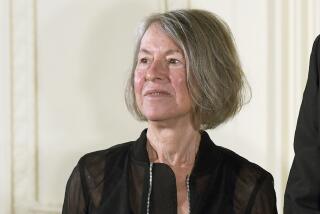Julia Tavalaro, 68; Poet and Author Noted for Defying Severe Paralysis
- Share via
Julia Tavalaro, who became the subject of magazine and newspaper stories and a book after she spent six years so paralyzed that people thought she was not cognizant, died Friday. She was 68.
During the six years, she was unable to let anyone know she was aware. Her senses were intact. She could understand, remember and think. She felt sadness, happiness and anger. But she was helpless. She could move her head and eyes, but the movements were hardly noticeable.
And she could not speak. Crying and screaming only fed the misperception that her body was present but her mind was not.
Her paralysis was the result of two strokes, the first in August 1966 at her home on New York’s Long Island, the second at a hospital in the Far Rockaway neighborhood of New York City. She was finally moved to Goldwater Memorial Hospital, a chronic-care facility on Roosevelt Island in the East River.
She lay there in bed until sometime in the early to mid-1970s. Medical records varied, but Tavalaro and hospital staff members at the time counted six years. She was mostly alone with her fantasies, her fears and her nightmares.
She tried to kill herself, but she could not even do that.
Finally, a speech therapist, Arlene Kratt, discerned cognizance in her eye movements. Kratt and another therapist, Joyce Sabari, embarked on a lengthy program to bring Tavalaro back and convince the world that she was present.
They taught her to communicate by moving her eyes as they pointed to letters on an alphabet board. They increased her head motion enough for her to touch a switch with her cheek, which operated a motorized wheelchair.
The switch also operated a computer. She began to write poetry.
She gained national attention in 1995 when The Los Angeles Times Magazine published her life story. It was republished by Newsday on Long Island and in other newspapers across the country. In collaboration with Richard Tayson, a fellow poet, she wrote an autobiography, “Look Up for Yes.” She became the subject of TV magazine shows.
Her family, under the guidance of a niece, Linda Tropiano, helped her move out of the hospital and into a private nursing home. For the last several years, with help from a friend, Joe Filippone, she was able to leave the facility on visits.
After contracting pneumonia this autumn, she began to fail. She died at Filippone’s home with family and friends, including Tropiano, at her bedside.
She is survived by her daughter, Judy; grandson, Harrison; sisters Joan and Midge; and a brother, Joe.
More to Read
Sign up for our Book Club newsletter
Get the latest news, events and more from the Los Angeles Times Book Club, and help us get L.A. reading and talking.
You may occasionally receive promotional content from the Los Angeles Times.









